Tag: choices
Know when to go
A common mistake among people who quit their jobs is that they wait too long to do it. When things start going badly, it’s natural to ignore it at first, and then take a wait-and-see approach, hoping it will get better. If it doesn’t, you might find that your self-esteem erodes, your health suffers, and you start to doubt whether you can find a better job somewhere else.
It is especially difficult if you are in a specialized field, or if you live in a place with few other employers. You might feel trapped.
You’re probably not trapped.

Yes, quitting whenever you want is a privilege for those with wealth and opportunities. But if you’re earning an income, you can take steps to build up your bank account and create more choices for yourself. I wrote about this in more detail in my Savings = Options blog from 2014.
Beyond financial needs, the biggest blocker is often a person’s own mindset. It’s easy to get discouraged and lose sight of possibilities. When you’re in a negative work environment for an extended time period, you can develop a trauma-like response. Your mind starts filtering out the wider world because you’re in survival mode, focusing only on what’s in front of you.
It can be hard to pull yourself out of that state, but people do it every day. Just knowing that fear distorts perception is a start. Don’t believe everything you think about yourself.
Ask people you trust if you have an accurate belief in your employability. I was once asked by a very clever person who had a solid track record in his day job and a successful side hustle if I thought that other companies would want to hire him. Yes! Definitely!
Another thing that people do when they’re struggling with a bad job is to find reasons not to pursue new ones. People invent justifications before investigating whether their assumptions are true or not.
“That company’s office is too far away, and I hate to commute.” Maybe. But maybe they would let you work at home part of the time, or if it is a tech giant, maybe they have a free corporate shuttle with Wi-Fi. Or your work schedule would let you miss the worst of heavy traffic. You won’t know if you don’t pursue the role in the first place.
Dying trees and new jobs

I’d hoped the tree would recover but after two years of stunted growth and increasingly bare limbs, I had to face that this wasn’t going to happen. A fungus got in the soil and the 16-year-old Japanese maple was too weakened to heal. It was sad; I had watched that red-leafed maple grow from 6 feet all the way up to the top of my second story window. I wanted to give it a chance.
I finally accepted that to have a healthy tree that will live a long time and grow to a full height, the diseased tree would have to be removed. Even part of the roots, to make room for the new planting.
I wanted to replace it with an identical tree that matched my neighbors’, but that would leave the new tree susceptible to the same infection. Instead, the arborist recommended a different species that is immune to the fungus.
I had invested a lot of time in caring for the tree and it was familiar and important to me. In the last few years it was finally tall enough to offer some shade on the hot, western side of my home. A new planting would be expensive, especially one that was partially grown. Although I had good reasons to keep my tree, or at least a replica of it, it wasn’t the smartest choice.
This is a great metaphor for a job that is no longer right for you. Just as I was invested in my tree and the shade it provided, you might be deeply enmeshed in your current role and have valid reasons why you want to stay, even though parts of your job are “diseased.”
And just as I knew that a replacement would have costs, including years of growing tall enough to provide protection from the sun, a new job often means losing some benefits and requires time to develop credibility and goodwill with new coworkers and managers.
Thinking about what you’ll give up and the risks of making a change can be paralyzing. But if I had replaced the maple when it first showed signs of damage, I would be much closer to having the shade I want for my window and balcony. Waiting didn’t change the inevitable outcome…it just raised the price of the tree with inflation and lengthened the time I’ll have to wait for it to grow tall.
If you are unhappy in your job but delay getting a new one, how much more will your confidence and stress levels continue to suffer? Bad jobs drain energy and wellbeing. It’s easier to look for a job and convince interviewers to hire you when you’re mentally and physically strong.
Back in November, I finally had the tree replaced. The new planting was about 6 feet tall but thin and bare-branched. I had a bag around the trunk to fill with water during dry weather and nurtured the heck out of that tree. It paid off. The over-wintering allowed roots to get established and by the time it started leafing, it had already grown more than a foot taller.
And then, because life is like that: PLOT TWIST!

As the leaves started to develop in April, I kept remarking to my neighbors that even though it was a different species, it looked very similar to the other Japanese maples. After the third time I said this, it dawned on me that they had planted the wrong tree.
The arborist had provided two quotes back in November. One was for an “Acer Palmatum Blood Good” – a Japanese maple varietal and the other was for a Stewartia Pseudocamelia. I ordered the Stewartia but they planted the maple.
At this point, I was attached to this little tree that had been growing for months and reluctant to start over. After multiple conversations with the arborist, I agreed that the best long-term choice was to replace the maple with the Stewartia because it isn’t susceptible to the fungus in the soil. But when the day came, they called me from the nursery to double check that the green-leaved Stewartia was what I wanted.
Uh…it had been over 7 months since I first met with the arborist, but I remember seeing a picture of a red-leafed tree. On the phone, they said that the tree turns red in autumn, but is green the rest of the year.
That was enough for me to say no to the replacement.
My new tree was already established, thriving and matched the neighborhood trees. I know there’s a risk that if the limbs suffer damage, it won’t be able to fight off the fungus and I will have to replace it. It is not an ideal environment for its longevity. But right now, the young maple is healthy and beautiful, and I want to keep it. If in later years it becomes diseased, I will immediately have it replaced – with as large of a tree as possible to more quickly reach the height I want.
This is another metaphor for changing jobs. You go into a new role with expectations based on your research and what you’ve been told, but sometimes the reality is different. Your day-to-day tasks aren’t what you thought they would be. The manager who hired you leaves, and now you must get to know their successor. The organization’s priorities change, and you are asked to cancel a project or take on a new set of responsibilities.
If you end up disliking your new job, you don’t have to suffer through it. You can attempt to negotiate with your management to improve what isn’t working, especially the parts that are different from the job description you agreed to. If that doesn’t work, you can start the job search again. Just because it’s a new role doesn’t mean you are stuck with it.
Maybe, though, once the surprise has worn off after finding your new role isn’t what you anticipated, you’ll realize that it’s fine. All changes come with risk. Calculated risks are better than steadily declining in a diseased environment.
5 Second Rule

The other day I was eating cake at my desk when I accidentally knocked the pan off the table. It landed frosting-side down on the carpet.
My first reaction was to panic in case the frosting had become smooshed into the carpet strands (it hadn’t). Then I laughed, calmly picked up crumb after crumb with my fingertips and got back to work.
I was glad I didn’t get frustrated about the mess and the time it took to clean up. I think my relief at not having to deep-clean a quarter inch of chocolate goop out of carpet fiber helped me relax and find the humor in it. But I also remember a flicker of a moment when I decided to think it was funny instead of a setback to my schedule.
Maybe the next time I have a setback with work, I’ll use that blink of time to lighten up, or steel myself, or to decide to shrug and let it go. Kind of like I did with the cake crumbs.
Tiny Decisions
 When you feel stuck in a bad job, it can seem like there’s no good solution. The obvious choices are often weighty ones that have a big impact on your life.
When you feel stuck in a bad job, it can seem like there’s no good solution. The obvious choices are often weighty ones that have a big impact on your life.
Quit? Try a different career? Move to a new city?
A new job can change your hours, commute, paycheck, the type of people you spend your day with – in addition to changing what you actually do at work. It can be overwhelming to think about all the ways your life will be altered – and tempting to do nothing to avoid the risk of making the wrong decision.
But doing nothing keeps you feeling stuck.
You don’t have to make all-or-nothing decisions.
Making one tiny decision at a time reduces pressure and could ultimately create a better outcome. Each tiny decision has low stakes, so it doesn’t matter if you don’t like the results of any particular choice. Whether you like the results or not, you’ve got the feedback you need to help you make the next tiny decision.
For example, a common tiny decision would be looking at job postings for a company you think you’d enjoy working for. If you like what you read, the next tiny decision might be looking up employee reviews on Glassdoor. Or finding people who’ve worked there and ask them about their experience.
If at any point you don’t like what you’ve learned, you can stop going down that path and try a completely different tiny decision. Like taking a free online course in a subject that interests you. If you dislike it – quit. Then try something else. Maybe you are still interested in the topic, but reading articles about it will be a better fit than taking an online course.
Here’s an analogy for the difference between making one giant decision or a series of tiny decisions: A giant decision is like leaping from the starting point of a race to the finish line. Tiny decisions are like taking one step at a time, choosing where to put each footstep. The first way gets you there faster, and if you are confident that you’ll like the result – great. But if you’re unsure, smaller steps let you change direction more easily, while still propelling you forward.
Your Ethics Can Get You Fired
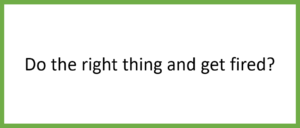 Maintaining a positive reputation at work means that sometimes you don’t speak up when something’s wrong. We all know the sayings, “don’t rock the boat” and “pick your battles.” When the issue goes beyond a gray area, or a slight bending of the rules of the employee handbook, you’re in a tough position.
Maintaining a positive reputation at work means that sometimes you don’t speak up when something’s wrong. We all know the sayings, “don’t rock the boat” and “pick your battles.” When the issue goes beyond a gray area, or a slight bending of the rules of the employee handbook, you’re in a tough position.
Several years ago I had a conversation with two mid-career lawyers about sexual harassment in the workplace. Both of them said that they would not tell their firm’s HR department or file a complaint if they were sexually harassed. They were sure that they would be fired in retaliation and black balled in the legal community, preventing them from getting a new job in their field.
I asked what they thought about the moral obligation to report issues like this. Because if nobody takes a stand against harassment and discrimination crimes, then they will keep happening, both to the current victim and others. The two lawyers didn’t hesitate to say they wouldn’t ruin their careers over it.
Over the years I’ve heard many variations of that conversation, but this stood out because the people were lawyers. They understand the law, their rights, and the process to seek justice if wrongfully terminated.
They also understood the personal consequences of reporting a crime and decided it isn’t worth it.
That’s bleak, and probably why we admire some whistleblowers who expose large scale crimes in their workplaces. Calling out illegal activity is a huge personal risk. Up until the point when whistleblowers are national heroes talked about in the media, they might be considered by their company’s peers and managers to be rats, tattlers, trouble makers, whiners, complainers, and ungrateful losers who should have been happy they had jobs in the first place.
They might be called all of those things and also be freshly unemployed. With a bad reputation that makes it difficult to be hired elsewhere.
Other people told me stories about being instructed by their managers to lie to investigators about crimes they witnessed. One man admitted that he lied under oath in trial court because his supervisor demanded that he do so or else lose his job.
Where do you draw the line between self-preservation and ethics?
I’m guessing most of us think we would make the ethical choice if we were in situations like that. But when people are actually in a position to lose their livelihoods, I doubt it is such an obvious decision.
I’m glad there are some people brave enough to sacrifice their personal wellbeing to stand up to workplace crimes.
Doing what you don’t want to do
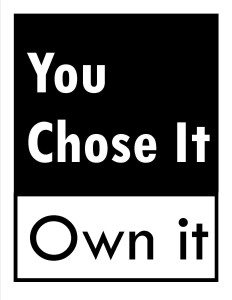 When it comes to doing something I don’t want to do, I make one of two choices:
When it comes to doing something I don’t want to do, I make one of two choices:
- I don’t do it
- I do it, and am clear about my reasons why
In career-land, this practice has been extremely useful. Anytime we work with other people there will be much that is out of our control. If we’re working for someone else’s business or entity, we don’t control the budget or policies. When we’re working with clients, we don’t control their business decisions. We don’t control the way other people act, either. There will be plenty of times when we are asked, told, or demanded to do things we don’t want to do.
At surface level, this is disempowering. However we almost always have choices. We can choose to go along to get along, negotiate, or say no and let the consequences be what they will be. Sometimes we make choices because we believe that the short-term discomfort is worth the long-term gains. Those gains might be money, career advancement or more opportunities later on. In any case, acknowledging to ourselves that we’re making a choice takes our power back.
I have a great non-work example. Last month I decided to do a showcase dance performance, something I’d been thinking of for the last three years. A non-competitive showcase is basically a dance recital for adults. In my case, I will be performing a Latin fusion routine with my dance instructor as the lead.
Partner dancing is one of my favorite hobbies. I’m most comfortable with country two step and other “bar dances” like the Cowboy Cha Cha, Schottische, and Horseshoe and have done them enough to have a great time without thinking much about the footwork. I also do ballroom dancing once in a while.
I will tell anyone that with all of these dances, I’m not a technical dancer. The moves are not executed perfectly and I’ll get off step once in a while. But I’ve danced enough to follow experienced leads and get back on count quickly, and I rely on styling and smiling for the rest. This has been just fine to have fun social dancing.
With this showcase, however, I’m learning a style of dance that is new to me and I want to be as technically accurate as possible from the beginning.
New style + new focus on technical precision = frustration2.
The Latin movement that I’m learning for the Rumba and Cha Cha is completely different from the type of dancing that I’m used to. I have to learn to move my feet, knees, hips and ribcage in a new way. It’s so unnatural to me that I feel like I’ve never danced before.
It reminds me of the last adult ballet class I took a few years ago, but it is even more painful. In ballet I can feel what the movement is intended to be even if I don’t perform the moves or sequences correctly. Latin motion is so new that I have no idea if I’m doing it right unless the instructor tells me.
To prepare for the showcase in two months, I’m taking three hours of lessons each week. It’s confusing, frustrating and embarrassing and I get so mad because each step is a struggle to execute correctly. I mostly hate it. And my attitude in class shows it, which isn’t fair to my instructor and only makes the lessons harder for me.
I could quit but I won’t. After years of relying on energy, expression and fancy moves instead of technical details, I am determined to learn how to perform the dances accurately. I’m choosing to take lessons that I dislike in order to dance well at the showcase and be a better social dancer afterwards.
In next week’s lessons I’m going to remind myself of the goal that I’m working towards. I’m also going to focus on being grateful for the opportunity and try to bring a lighter attitude to the studio.
To motivate myself, I watched the movie Dirty Dancing. If Baby could learn the Mambo in less than a week, I can learn Latin Rumba and Cha Cha in two months.
This experience is good practice for the work realm: remembering that I have a choice about doing things I dislike, including my attitude.
I still plan to have as many spins and dips in my routine as I can convince the choreographer to include, including something like the picture below.
 I have 63 days to work on this backbend. My hands and feet should be closer together with more arch in my spine and my leg pointed straight up in the air. The pretty sunset is like the flair that used to distract attention from my sloppy footwork. This time I want solid technique as my foundation and the fancy moves to be an enhancement.
I have 63 days to work on this backbend. My hands and feet should be closer together with more arch in my spine and my leg pointed straight up in the air. The pretty sunset is like the flair that used to distract attention from my sloppy footwork. This time I want solid technique as my foundation and the fancy moves to be an enhancement.
Will I do it? Yes I will. Nobody puts Baby in the corner.
Regaining Confidence After a Bad Work Experience
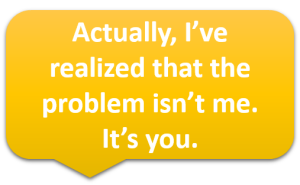 Bad jobs can hurt our souls. Humans thrive on contributing to things larger than ourselves, being productive, positive interactions with others and recognition for our efforts. A job is much more than a means to pay the bills.
Bad jobs can hurt our souls. Humans thrive on contributing to things larger than ourselves, being productive, positive interactions with others and recognition for our efforts. A job is much more than a means to pay the bills.
When a rotten manager tells you your work isn’t good enough – or you’re not good enough, it wounds your spirit. When coworkers blame and shame you, it rips little holes in your psyche. Even if you know that you add value to your company and that you do good work, even if you think your managers and their minions are idiots — constant negative feedback is damaging.
Many people who I’ve spoken with about quitting their jobs told me they lost confidence in themselves because of bad work experiences. These are people who have grown their careers, earned advanced degrees, or led initiatives that made millions of dollars for their companies. Some of them have tough reputations, and aren’t especially sensitive to criticism. Yet the negativity they endured made them unsure of themselves.
If you haven’t experienced a job like this and you’re not close to someone who has, you might be thinking, “If they were such great workers, why did their managers treat them so poorly?” Well, that is the reality of many organizations – whether military, education, corporate, religious or any other field — there is dysfunction. Often a team needs a scapegoat to blame for poor results, or to use as a target to vent their own insecurity and anger. Sometimes it is the company culture. Sometimes it is just crazy-making.
Feeling insecure about your value as an employee is not a great state to be in when searching for a new job. Interviewers can smell fear, and if you’re questioning your abilities, you may settle for a job you don’t want or accept a lower salary than you deserve.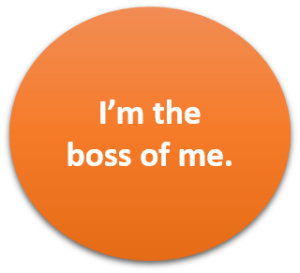
It took some people two or three years to regain their confidence and self-esteem after a terrible job, regardless of whether they were fired or quit on their own. Ugh. That is too long to let the jerks continue to have power over you. Fortunately, it doesn’t have to be this way. The people who bounced back quickly have this advice:
- Take back your power right now. Remind yourself as many times a day as you need to that this is your life. You get to choose whether you tell your coworkers “don’t talk to me like that” or quietly plot your exit while biting your tongue.
- You are more than your job. You are not your title, your company, or your salary. You are a whole person with many parts to your life. Know that your value as a human being is based on many things, but how your boss treats you is not one of them.
- You have skills and talents. When you feel low because you only hear what your manager thinks you are doing wrong, remember what you are good at. Write a list of your positive work traits if you need to. Take the Strength Finders test. Think of all you have accomplished in the past. When you’re scanning the job listings or updating your resume, this is the frame of mind to be in.
If you’ve left a horrible job or are currently in one, I hope you hold onto your self-worth and use what you’ve learned about the experience. You may come out on the other side with clearer boundaries, greater awareness of your strengths, and the confidence that comes from knowing that actually you are the boss of your own life.
Is Your Job Making You a Jerk?
Is Your Job Making You a Jerk? Here are a several signs of jerk behavior:
- Are you impatient with your coworkers and staff?
- Do you blurt out statements instead of thinking about how to phrase your communication in a way that will allow others to listen without getting defensive or hurt?
- Do you put a lot of effort into presenting yourself as if you are happier and calmer than you are?
- Do you frequently vent your frustration or complain to others?
If so, either you were already a jerk, or your job is not bringing out your best behavior. If you think that deep down you’re a nice person, or you used to be, there’s hope.
We’ve all heard the phrase “a toxic work environment.” Except instead of your bloodstream being poisoned by toxic chemicals in a non-OSHA approved factory, your soul is poisoned by absorbing too much negativity in the workplace. It might stem from a manager who rules by fear, or takes out his own fears on you. It might come from a team of colleagues who fill meeting rooms with hostility. Or there are office bullies and back-stabbers to contend with.
It might be that your official duties make no sense, you’re required to work so many hours that you’re constantly exhausted, or you’ve seen enough coworkers fired that you’re just waiting until the axe falls on you.
If you are surrounded by negativity you probably aren’t the friendly person everyone wants to eat lunch with in the cafeteria. It is draining to put effort into positive behavior when you are miserable at work. Over time, you lose your capacity to control it. You may be low on the scale that spans from “occasionally rude” to “a monster from hell”, but why be on the jerk scale at all if you can help it?
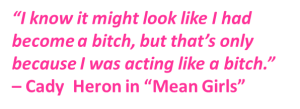 On the other hand, if you are non-stop cheerful despite working in a terrible environment, that is…not normal. You’ve either attained enlightenment or are detached from reality. Better to acknowledge the truth and then take action to change it.
On the other hand, if you are non-stop cheerful despite working in a terrible environment, that is…not normal. You’ve either attained enlightenment or are detached from reality. Better to acknowledge the truth and then take action to change it.
So what is the solution?
Quit.
Think about it: if you actually worked in a factory full of toxic chemicals, wouldn’t the best way to avoid poisoning your body be to stop exposing yourself to the toxins?
If you aren’t ready or willing to quit immediately, you can do a few things to protect yourself in the meantime. First, make a plan to quit! Save money, update your resume, network – you know the basics. Having a plan reminds yourself that you are empowered to make choices for your own life and that you are on a path leading to a better job.
Next, go ahead and vent – but only to one or two trusted coworkers who see the work environment the same way you do. Being able to tell someone about the crazy business decision that your boss just made will make you feel better, but only if your coworker gets why it is crazy and validates your frustration. Having a friend in the workplace who you can speak openly to without repercussions helps burn off that negative energy. It can also keep you from complaining to the wrong people – the people who are not on your side.
Finally, consider Dale Carnegie’s 30 principles from his book “How to Win Friends and Influence People”. All of the principles are useful to become a friendlier person and a more effective worker. My personal favorite is number 12: “If you are wrong, admit it quickly and emphatically.” When your jerk behavior gets the best of you, immediately apologize to the person you offended. Apologies show that you’re human, humble, and trying your best.
If your job is making you a jerk, know that it doesn’t have to be that way. You deserve a better workplace and a better attitude. Take steps to detox the negativity from your system. And be nice.
Did Your Manager Go to the Dark Side?
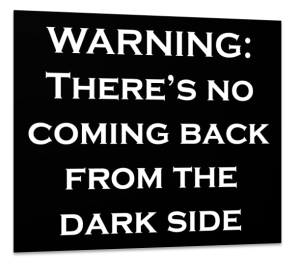 As I researched the topic of people quitting their jobs, I heard a lot of stories about evil managers. No surprise, right? Unfortunate employees across all industries had tales of harassment, corruption, and behavior that would be shocking if it wasn’t so prevalent.
As I researched the topic of people quitting their jobs, I heard a lot of stories about evil managers. No surprise, right? Unfortunate employees across all industries had tales of harassment, corruption, and behavior that would be shocking if it wasn’t so prevalent.
The saddest stories I heard were the ones about bosses that didn’t used to be evil. Their ex-employees told me that some of them used to be great. They were effective leaders who clearly communicated expectations and treated their staff with respect. There was mutual trust and positive manager/employee interactions.
What made these bosses go to the dark side?
- The managers’ workloads skyrocketed and they did not have the support of their own bosses.
- They were promoted to higher levels and as their egos inflated, their people skills declined.
If you have a boss who turned evil and you’re clinging to the shreds of the person he or she used to be, your odds aren’t good. I only heard one story about a bad boss who became more supportive of her staff as her home life improved. But she was one who started out evil. I didn’t find any stories of people making it back from the dark side once they crossed over.
It can be cathartic to share stories of nasty bosses, but I’d rather learn something from these scenarios. First, if you’re reporting to a bad boss, you know it probably won’t get better. Now is a good time to start planning your next career move.
Second, there’s an opportunity for self-reflection and choice. When I worked in a difficult environment and was constantly stressed, scrambling to meet last-minute deadlines, and exhausted, I didn’t have my full set of interior resources to draw upon. It took much more effort and energy to put the Dale Carnegie and Emotional Intelligence skills I’d learned to use. I had less time to help others and less patience with mistakes. I didn’t like that my behavior and attitude could be negatively impacted by my job. When I changed careers, one of my priorities was to work in environments that enabled the best version of me to show up more often than not.
Leave the evil bosses behind.
And when you grow your own career, remember the warning signs. Don’t go to the dark side.

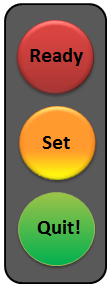 I was stuck in stop-and-go traffic for almost hour this evening. I would rather have been home already, or at least driving at a steady speed, but wasn’t really annoyed. I was on the fastest route and there was nothing I could do to make traffic move more quickly.
I was stuck in stop-and-go traffic for almost hour this evening. I would rather have been home already, or at least driving at a steady speed, but wasn’t really annoyed. I was on the fastest route and there was nothing I could do to make traffic move more quickly. 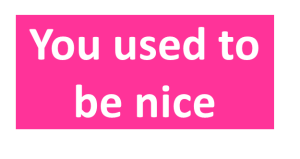
Recent Comments